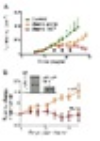Anti-ADAM10 antibody (8C7) for cancer therapy

|
Novel mAbs that bind a unique epitope on a cancer-associated form of the ADAM10 metalloprotease. Inhibiting ADAM10 blocks activation of receptors linked to the ‘stem cell niche’ and depletes cancer stem cells resistant to chemotherapeutic treatments. The lead mAb is potentially useful as ‘cancer specific’ single agent, drug conjugate and/or combination therapy.
- Proof of concept data shows single agent and combination efficacy in vivo
- Potential use as naked and/or functionalised (ADC) therapeutic
- Targets ‘stem cell niche’ to sensitise chemoresistant tumours
The development of tumour-selective ADAM10 inhibitors offers an improved approach to treating aggressive cancers such as Her2+ breast cancer, and preventing chemoresistance, without the safety issues commonly associated with non-selective MMP inhibition.
8C7 (Lead mAb) preferentially binds active ADAM10 at a conformation-specific epitope prevalent in tumours but not in normal tissue. Preclinical studies showed that 8C7 inhibits ADAM10- mediated cleavage and activation of Notch and RTK signalling. In colorectal cancer (CRC) xenograft tumors, 8C7 preferentially targets tumors, especially CD133+ stem cells, and inhibits tumor growth as well as the expression of key ADAM10 targets. In combination with irinotecan (a topoisomerase I inhibitor used clinically for CRC), 8C7 prevents tumour relapse with a marked reduction in CD133+ stem cells in remaining tumours. Fully human mAb 8C7 is in development and further combination studies are underway.
Licensing
04/02/2015 00:00:00
AU 2015213481
Others
Monash seeks a partner to clinically develop and translate this opportunity.
2014-001
Australia


